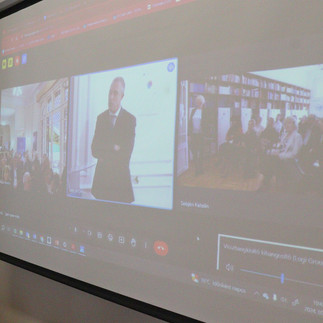Maastricht Treaty - EU citizenship: Local event in Budapest
- Tessy Melidi
- Jun 22, 2024
- 3 min read
Updated: Dec 10, 2024
A workshop on Maastricht Treaty - EU Citizenship was organised on 9 May as part of the international project European Local Citizens.
Dr Tamás Szabó, chairman of the Homo Oecologicus Foundation presented the impact of the European citizenship on the local level, and the different aspects of the Hungarian society. He explained the definition, and features of European citizenship and the Maastricht Treaty. Regarding the social impact he shared that around 137,000 non-Hungarians living in Hungary and 35,000 EU citizens recognised as refugees or long-term residents will be able to vote in the local elections on 9 June 2024.
In addition to the 7.69 million Hungarian citizens living in Hungary, more than 35,000 foreigners recognized as refugees or long-term residents and 137,000 citizens of other EU member states living in Hungary will be able to vote in the local elections.
In the European Parliament (EP) elections, EU citizens living in Hungary can choose to vote for the Hungarian EP lists instead of their home country. However, they must register to do so, and 3,600 have done so far.
In 2011 there were 143,310 non-Hungarian foreign citizens living in the country, but by the time of the 2022 census there will be 218,061 non-Hungarians, one and a half times as many.
Contrary to this fact and the public perception of the seriousness of migration, the proportion of foreigners is one of the lowest in Europe and well below the EU average.
After the presentation the Hungarian event was connected online to the event of the Romanian partner, UNCJR.
Sorin Munteanu, General Manager UNCJR welcomed the participants and shared that a very interesting discussion started in Bucharest on European citizenship.
Katalin Kolin Sabján said that European citizenship is not merely a theoretical concept but a living reality for millions of people across Europe. From the rights of free movement and residence within EU member states to the right to vote and consular protection outside the Union, European citizenship entails a set of privileges and responsibilities that shape our experience as citizens of Europe.
However, despite the progress made, she pointed out that there are still challenges and barriers hindering the full realization of the potential of European citizenship. Local governments have to ensure that European citizenship is not just a privilege for a few but a guaranteed right for all European Union citizens, regardless of their origin, the member state they reside in, or their socio-economic status.
She said, that “today, in the spirit of collaboration and friendship between our local communities, we are here to commit to working together to promote European citizenship and to build bridges between our peoples. Through the exchange of best practices and experiences in this project, we can learn from each other and build a stronger and more inclusive Europe from the grassroots up.”
After having some questions and answers between the Romanian and Hungarian participants, the workshop continued with a panel discussion with Péterné Boros President of Trade Union of Hungarian Civil Servants and Public Employees (MKKSZ), Dr Tamás Szabó PhD, Chairman of the Board of Trustees, Homo Oecologicus Foundation and Katalin Kolin-Sabján Secretary of International Affairs, TÖOSZ. The main focus was on how to promote gender equalities on local level including among European citizens. MKKSZ represent civil servants working in offices of local governments, who are working with European citizens as clients. Péterné Boros emphasized the importance of providing language skill development for staff of local governments.





















Comments